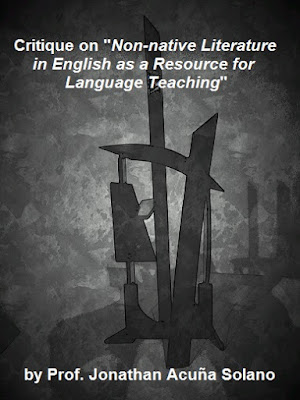Minding Your Own
Language Learning
By Prof. Jonathan Acuña Solano
Sunday, June 28, 2015
Twitter: @jonacuso
Post
177
Mindfulness does not just mean to be
aware of what others do or feel (or what I, as an individual feel and do), but
it is a conscious act that allows us to introspectively and retrospectively
analyze how things happen(ed) in life, such as the way a foreign language was
acquired. At times it is helpful to place oneself in the shoes of one’s
learners to tell them that one understands what they are going or have gone
through as language students. Let’s mindfully ask ourselves these questions or
just read the following answers.
“What
were the contexts in which you felt you were most successful in learning a
language?” Since now I am getting to understand language learning processes
better, in hindsight I can see myself years ago learning English and being
exposed to lots of social interaction in class, but with one professor I got at
University of Costa Rica whose class was solely delivered from her desk. Prof.
Pacheco never gave me or my partners any way to socially work with other peers
to try out the development of our interlanguage and test our comprehension of
the target language. Now as an ELT instructor, and thanks to that Prof. Pacheco,
in a mindful act for the sake of my lesson plan, I provide my pupils with
zone-of-proximal-development opportunities to exercise their English, to feel
comfortable in my class, and to give their interlanguage a try. Somehow I want
to guarantee that my language trainees get a classroom setting that inspires
them with activities that can foster their language proficiency in a social
context.
“Did
you learn best in a classroom context?”
With language instructors such as Prof. Pacheco at UCR, I cannot see much
evolution of language in learners (because I saw none in my case). But my
personal language learning story is not just connected to a single unmindful teaching professional; there
were people who really helped me a lot to continue developing my language. However,
being retrospectively and mindfully alert, the classroom context was not the
best place for me oftentimes. There were partners who recurrently went back to
our native language to discuss what the instructor asked us to consider and
talk over among ourselves. Committed peers were not always nearby, and for that
reason I self-taught myself many things I could not either learn with my
uncooperative peers or in a class that turned out to be too theoretical and
abstract for me or socially tracked off. As a language instructor, and in an
act of mindfulness once more, my
students are much more involved in routine tasks that can assist them to help
them develop their language proficiency in various ways: from grammar to
pronunciation, and from social skills to hierarchical thinking skills. Anything
that resembles the way native speakers use the language in a foreign country is
something that can be tried out in class to help learners construct their
knowledge of the target language and to practice it.
“If
you have visited a country where you had to learn at least some basics of a
second language, what helped? What didn’t help?” As a language learner, I
never visited any English-speaking country, nor did I have to learn the basis
of a second language in a foreign country. I learned English in my
Spanish-speaking home country. It was until later in life, as a graduate
student, when I had the opportunity to travel to the United States for a
teacher training course, several years after I had graduated from UCR. But
before that traveling chance materialized, there were plenty of British,
American, and Canadian native speakers who shared their language with me
through lengthy conversations or small chats. In a mindful act in the search to
improve my language proficiency, I looked for any opportunity to have a
conversation with a native speaker to –once again- try out the evolution of my
interlanguage. At this point of my professional teaching life, I recurrently ask
my pupils to go and look for those opportunities to practice their English! And
better yet, if they can travel to an English-speaking country for a while, I ask
them to seize the chance and explore other linguistic horizons that are only
hosted in a country where the target language is spoken.
In brief, as a language instructor one
has to be mindful of how one’s language learning process took place. Our
experiences can be guiding stars for
what we want to instill in our learners to experience a more down-to-earth and
meaningful way of learning or to go and search for language experiences that
can help them learn, consolidate their learning, or try out what has been
learned and moved into the interlanguage. We were foreign language learners;
why can’t we use all that experience to assist our students in their language
learning journey?
Sunday, June 28, 2015






















